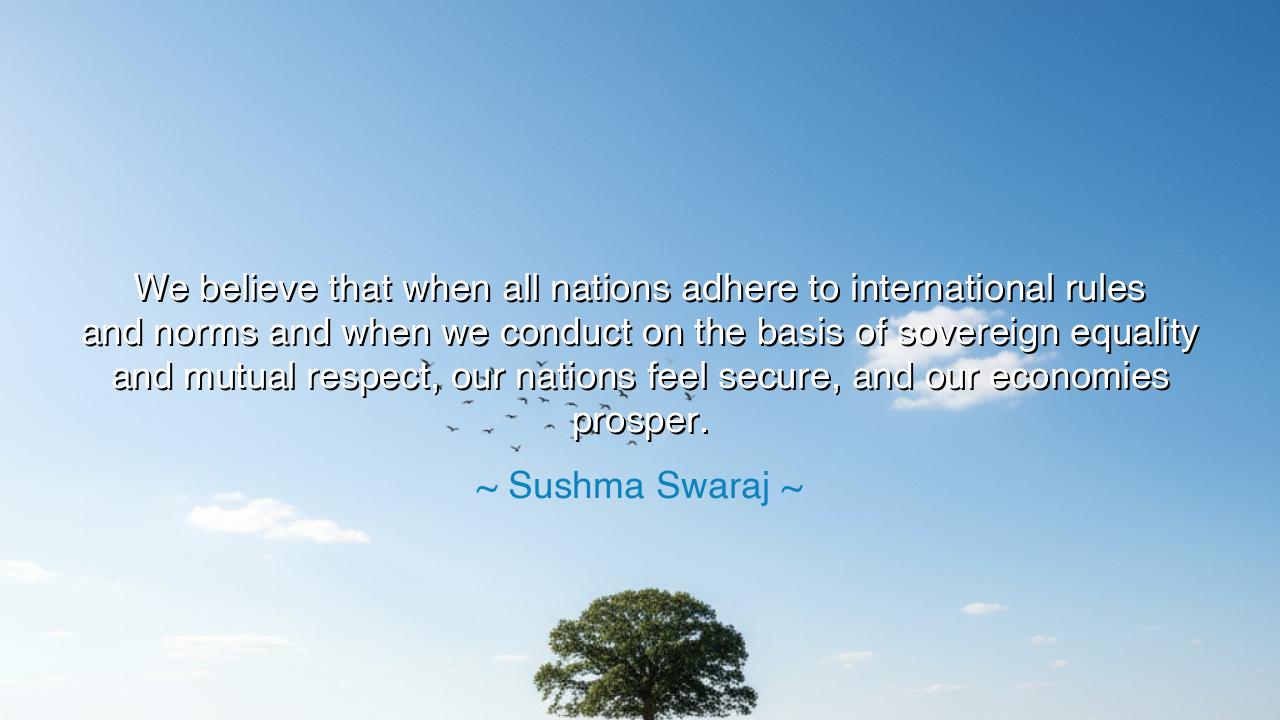
We believe that when all nations adhere to international rules
We believe that when all nations adhere to international rules and norms and when we conduct on the basis of sovereign equality and mutual respect, our nations feel secure, and our economies prosper.






In the ancient world, the concept of justice was often linked to the equilibrium of the cosmos—where the forces of nature, society, and governance existed in balance, governed by universal laws that ensured the prosperity and security of all. The words of Sushma Swaraj—"We believe that when all nations adhere to international rules and norms and when we conduct on the basis of sovereign equality and mutual respect, our nations feel secure, and our economies prosper"—speak to a deep truth that has echoed across centuries. It is the call for unity, respect, and cooperation among nations, where the rule of law transcends borders, and nations, in their collective strength, flourish together.
In the ancient Greek world, the philosophers understood the necessity of rules and order to maintain peace within and between societies. Plato, in his work The Republic, envisioned a world where justice reigned, not by the might of the strongest, but through a system based on equality and the common good. Socrates too, in his dialogues, argued that peace and prosperity could only be achieved when each person—each nation—recognized the rights and dignity of others. In this sense, Swaraj's words call upon the same principles that have guided the pursuit of justice and peace throughout the ages: that only when all nations recognize their sovereign equality and mutual respect, will true security and prosperity be within reach.
The importance of international norms is reflected in the story of the ancient Silk Road, which linked the great empires of China, Rome, and Persia. Despite vast cultural and political differences, these civilizations adhered to a set of trade agreements and rules of conduct that allowed them to exchange goods, ideas, and technologies. Through the adherence to shared norms and respect for one another’s sovereignty, they created a framework for cooperation that led to mutual prosperity. Trade flourished, and the security of their routes ensured the spread of not only wealth but knowledge, art, and culture across the globe.
In more recent history, consider the establishment of the United Nations after the Second World War—an institution built upon the belief that when nations come together in mutual respect, acknowledging their sovereign equality, they can avoid the horrors of war and build a world of security and prosperity. The UN Charter emphasizes the importance of upholding international law and the rights of nations, irrespective of their size or power. Just as Socrates and Plato championed the idea of justice being the foundation of a peaceful society, the UN sought to create a global framework where countries would be held accountable to common standards, ensuring peace and prosperity for all. Swaraj's words echo this ideal, emphasizing that the strength of nations lies in their collective commitment to international rules that uphold justice for all.
Sushma Swaraj's message is not just about diplomacy; it is about the very fabric of human existence in the modern world. The mutual respect she speaks of is not simply a diplomatic gesture but a call for a deep and meaningful relationship between nations. A sovereign nation does not exist in isolation—it is part of a larger world, and its security and prosperity are bound to the well-being of others. True peace comes when nations not only recognize their sovereignty but also their responsibility to the global community. The prosperity of one cannot come at the expense of the suffering of another. It is in this cooperation, this mutual respect, that the world finds its true strength.
The lesson we must learn from Swaraj’s words is one of shared responsibility and collaboration. It is not enough for nations to simply look after their own interests; true prosperity and security are achieved when nations work together, respecting each other's sovereignty and recognizing their mutual interdependence. International norms—laws that govern the interactions between nations—are not just abstract concepts but are essential to maintaining the balance of the world. It is in this spirit that we must move forward, creating systems of cooperation where the rights and dignity of each nation are upheld, and where peace and prosperity are not just ideals, but realities.
In your own life, take these principles to heart. Just as nations must recognize the importance of mutual respect and sovereign equality to ensure peace, so too must you in your personal relationships. Recognize that true security and prosperity come not from dominating others, but from working together toward shared goals, built on respect and collaboration. Whether in your community, workplace, or family, you can contribute to the building of a just and peaceful world by adhering to these principles—valuing the rights and dignity of others, and working in harmony to create a better future for all. Just as Swaraj envisions, it is only through collective effort, rooted in respect and equality, that we can ensure a future of prosperity for every nation and every individual.






AAdministratorAdministrator
Welcome, honored guests. Please leave a comment, we will respond soon